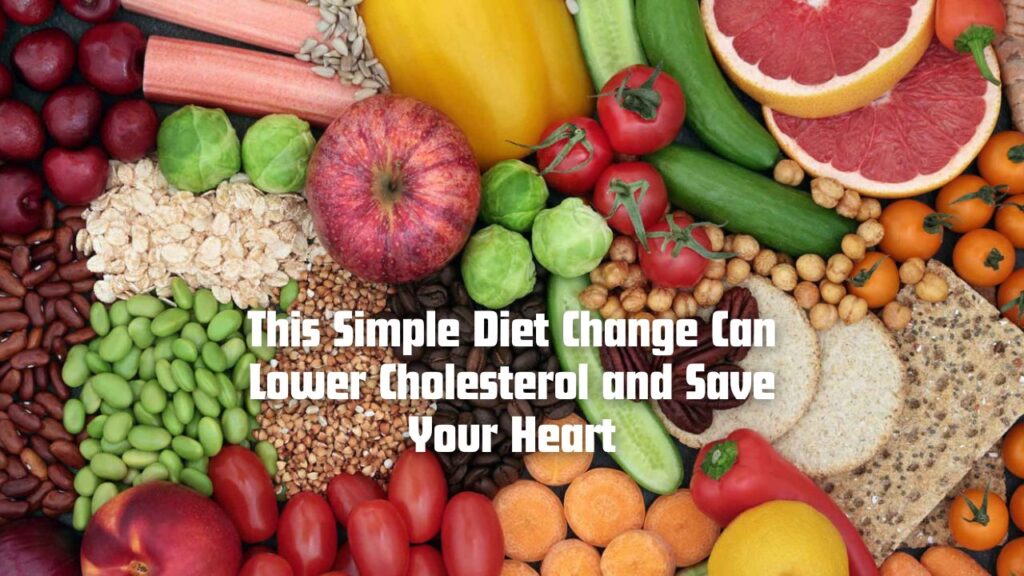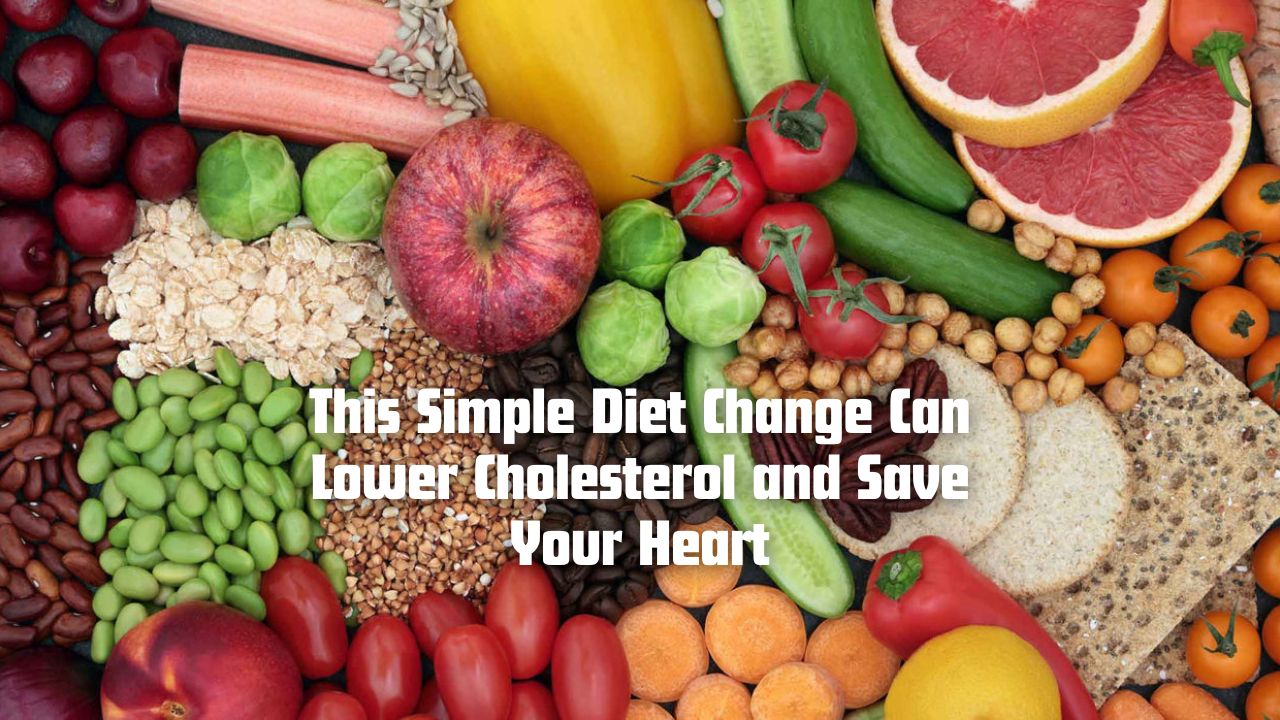This Simple Diet Change Can Lower Cholesterol and Save Your Heart
A plant-based diet is one of the best ways to lower cholesterol and improve heart health. Many people suffer from high cholesterol, which can lead to heart disease, stroke, and other serious health problems. Eating more fruits, vegetables, whole grains, nuts, and legumes can help reduce cholesterol levels and improve overall well-being. This article explains how a plant-based diet can benefit your heart and why it is a great choice for long-term health.
What is Cholesterol?
Cholesterol is a type of fat found in the blood. The body needs some cholesterol to build cells and hormones, but too much can be dangerous. There are two types of cholesterol:
- LDL (Low-Density Lipoprotein): This is called “bad cholesterol” because it can build up in the arteries and cause heart disease.
- HDL (High-Density Lipoprotein): This is “good cholesterol” because it helps remove bad cholesterol from the blood.
Eating unhealthy foods, especially those high in saturated fats and trans fats, can raise LDL cholesterol levels. A plant-based diet can help lower bad cholesterol and increase good cholesterol.
How a Plant-Based Diet Lowers Cholesterol
A plant-based diet helps lower cholesterol in several ways:
- No Animal Fats: Meat, dairy, and eggs contain saturated fats that raise LDL cholesterol. A plant-based diet avoids these harmful fats.
- High in Fiber: Fruits, vegetables, and whole grains have soluble fiber, which helps remove cholesterol from the body.
- Rich in Healthy Fats: Nuts, seeds, avocados, and olive oil contain healthy fats that lower bad cholesterol.
- Contains Plant Sterols: Some fruits, vegetables, nuts, and seeds contain plant sterols, which block cholesterol absorption.
- Supports Weight Loss: A plant-based diet is lower in calories and helps maintain a healthy weight, reducing cholesterol levels.
Best Foods for Lowering Cholesterol
Eating the right foods is important for lowering cholesterol and improving heart health. Here are the best plant-based foods:
- Oats and Barley: These contain beta-glucan, a type of fiber that lowers cholesterol.
- Beans and Lentils: High in soluble fiber, they help remove cholesterol from the body.
- Nuts (Almonds, Walnuts, Pistachios): Full of healthy fats and plant sterols.
- Fruits (Apples, Berries, Oranges, Grapes): Rich in soluble fiber and antioxidants.
- Vegetables (Spinach, Kale, Broccoli, Carrots): Help lower bad cholesterol naturally.
- Seeds (Chia, Flax, Sunflower): Provide omega-3 fatty acids and fiber.
- Healthy Oils (Olive Oil, Avocado Oil, Coconut Oil): Contain good fats that support heart health.
Benefits of a Plant-Based Diet for Heart Health
Switching to a plant-based diet improves heart health in many ways:
- Reduces Inflammation: Plant foods contain antioxidants and anti-inflammatory compounds that protect the heart.
- Lowers Blood Pressure: High blood pressure is a major cause of heart disease. A plant-based diet helps maintain a healthy blood pressure.
- Prevents Blood Clots: Certain plant foods reduce the risk of blood clots, which can cause strokes and heart attacks.
- Supports Artery Health: Eating more fiber-rich foods helps keep arteries clear and flexible.
- Lowers Triglycerides: High triglycerides can increase the risk of heart disease. A plant-based diet helps lower these harmful fats.
How to Start a Plant-Based Diet
If you want to lower cholesterol and improve heart health, start by making small changes:
- Eat More Vegetables: Include a variety of vegetables in every meal.
- Choose Whole Grains: Replace white rice, white bread, and pasta with brown rice, whole wheat bread, and whole grain pasta.
- Snack on Nuts and Seeds: These are great sources of healthy fats and fiber.
- Replace Dairy with Plant-Based Alternatives: Try almond milk, soy milk, or oat milk instead of cow’s milk.
- Avoid Processed Foods: Many processed foods contain unhealthy fats and added sugars that can raise cholesterol.
- Cook at Home: Prepare meals using fresh ingredients to control what goes into your food.
- Stay Hydrated: Drink plenty of water and avoid sugary drinks.
Common Myths About Plant-Based Diets
Many people believe false myths about plant-based diets. Let’s clear up some of them:
- Myth: Plant-Based Diets Don’t Provide Enough Protein
- Truth: Beans, lentils, tofu, quinoa, nuts, and seeds are rich in protein.
- Myth: You Will Feel Weak Without Meat
- Truth: A well-balanced plant-based diet provides all necessary nutrients.
- Myth: It’s Expensive to Eat Plant-Based
- Truth: Beans, rice, lentils, vegetables, and fruits are affordable and nutritious.
- Myth: You Need Dairy for Strong Bones
- Truth: Leafy greens, nuts, seeds, and fortified plant-based milk provide enough calcium.

The Connection Between Diet and Financial Health
A healthy diet can also impact your financial health. Eating whole, plant-based foods can save you money on medical bills by preventing diseases like heart disease, diabetes, and high blood pressure. Additionally, reducing meat and processed food expenses can help with budgeting and saving money.
Legal Aspects of Health and Nutrition
Some countries have laws that promote healthy eating. Governments encourage nutrition labels, regulate food advertising, and provide guidelines for healthy diets. Understanding legal policies related to food and health can help people make informed choices.
Conclusion
A plant-based diet is a powerful way to lower cholesterol, improve heart health, and boost overall well-being. It is rich in fiber, antioxidants, and healthy fats, which help reduce bad cholesterol and protect the heart. By making simple changes, such as eating more fruits, vegetables, whole grains, and nuts, anyone can enjoy the benefits of a plant-based diet. Not only does this diet improve physical health, but it also has a positive impact on financial stability and follows legal food guidelines. Start today and take a step towards a healthier heart!
FAQs – This Simple Diet Change Can Lower Cholesterol and Save Your Heart
How long does it take to lower cholesterol with a plant-based diet?
Many people see a drop in cholesterol levels within a few weeks to a few months.
Can I eat any meat on a plant-based diet?
A true plant-based diet avoids meat, but some people choose a flexitarian approach, eating meat occasionally.
Do I need supplements on a plant-based diet?
You may need vitamin B12, vitamin D, and omega-3 supplements, depending on your food choices.
Can children follow a plant-based diet?
Yes, with careful planning, a plant-based diet can provide all essential nutrients for children.
Is a plant-based diet good for weight loss?
Yes, many people lose weight because plant-based foods are lower in calories and fat.
Can a plant-based diet prevent diabetes?
Yes, eating fiber-rich foods can help control blood sugar and lower the risk of diabetes.
What if I don’t like vegetables?
Try different cooking methods, spices, and recipes to make vegetables more enjoyable.
Can I still eat desserts on a plant-based diet?
Yes, there are many plant-based desserts made with natural sweeteners and healthy ingredients.
Is a plant-based diet expensive?
No, whole foods like beans, lentils, rice, and vegetables are affordable and nutritious.
Does a plant-based diet give enough protein?
- Yes, you can get protein from beans, lentils, tofu, quinoa, nuts, and seeds.
